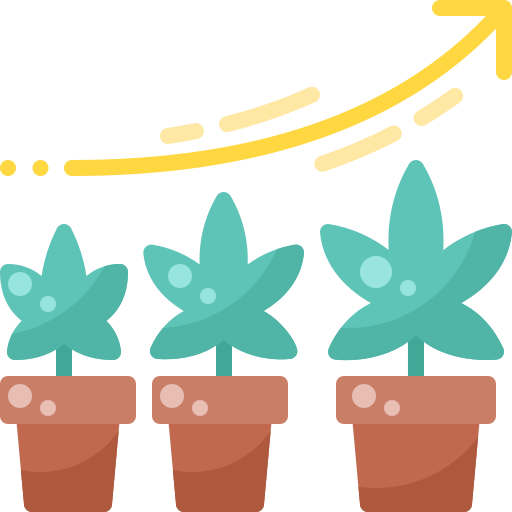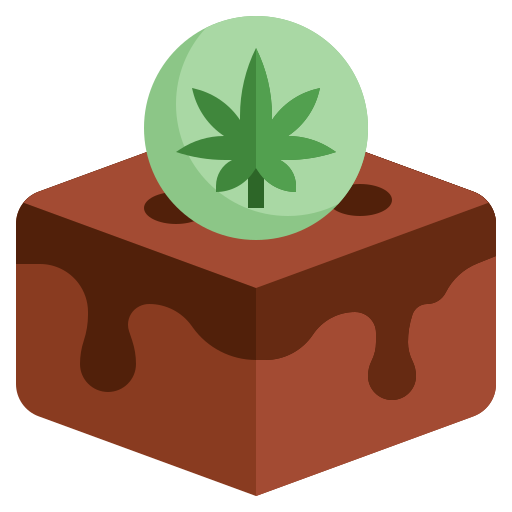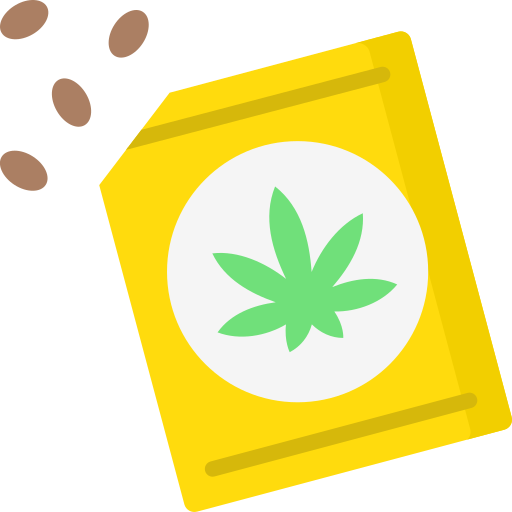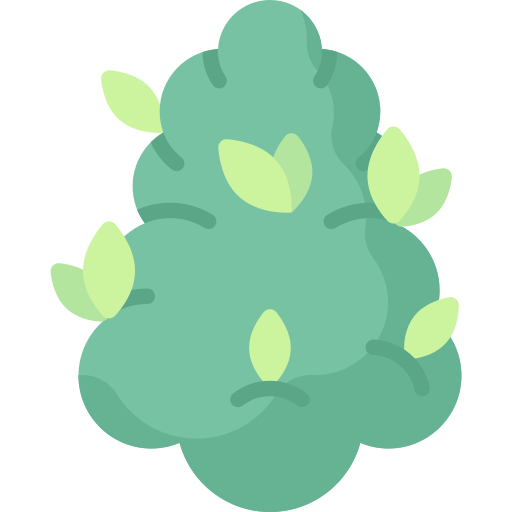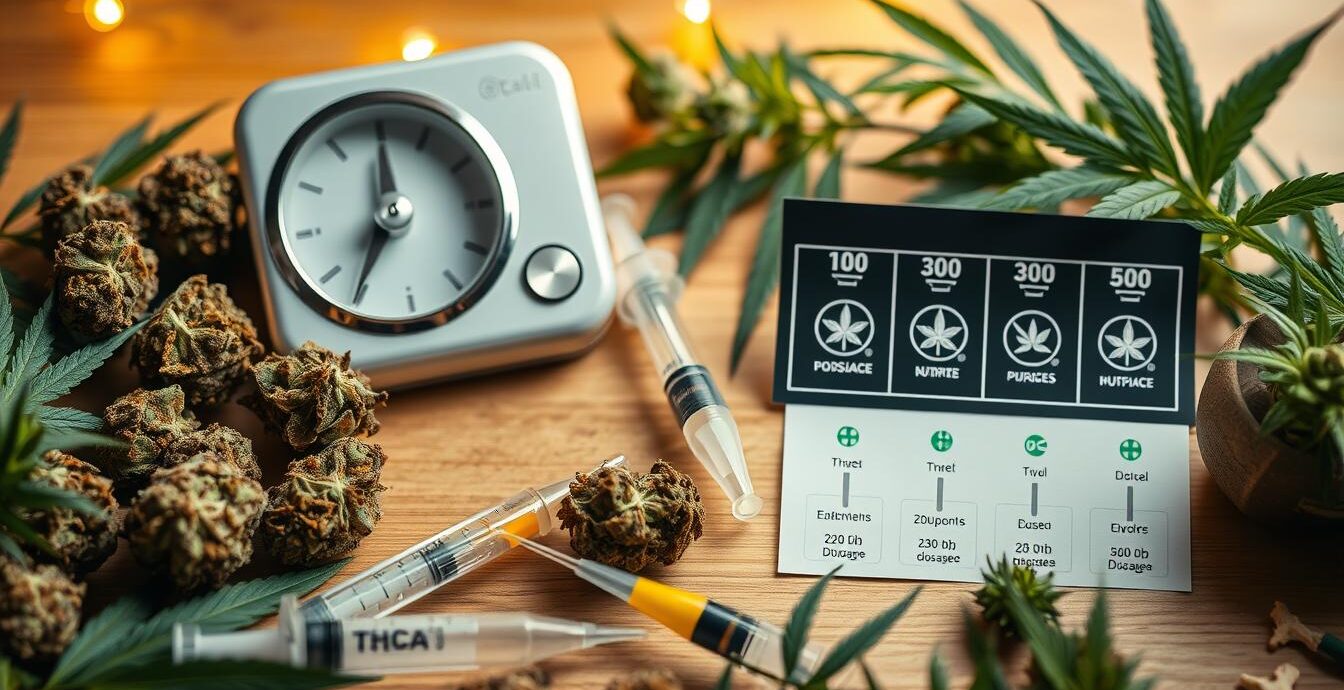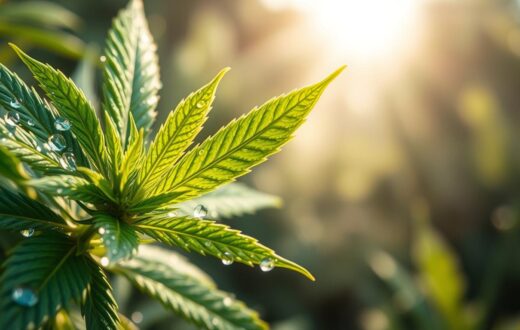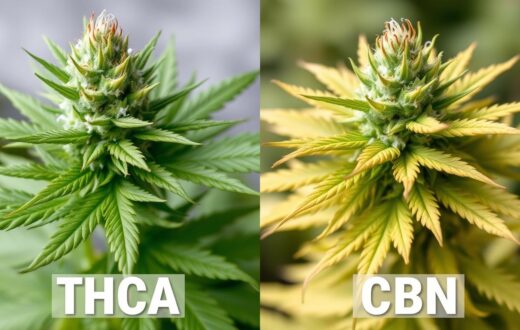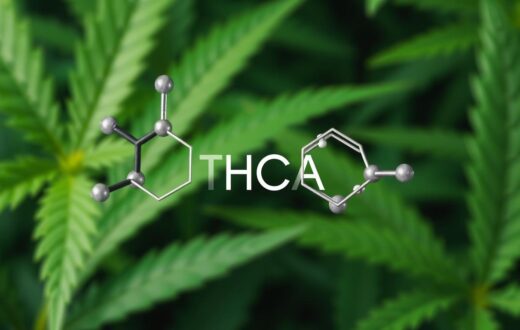Ever wondered about THCA, the precursor to THC? Our THCA dosage guide is here to reveal its secrets. It’s a non-psychoactive cannabinoid that offers unique benefits. We’ll show you how to find the right amount for your needs.
Whether you prefer raw flower or potent edibles, we’ve got you covered. Our guide is backed by experts. It’s designed to help you start a wellness journey that fits you perfectly.
What is THCA?
THCA, or tetrahydrocannabinolic acid, is a key cannabinoid in raw cannabis plants. It turns into THC, which gives cannabis its psychoactive effects. But, THCA itself is not psychoactive because it doesn’t bind to cannabinoid receptors in the body.
Definition of THCA
THCA is a major cannabinoid found in hemp, which is high in CBD. It’s made in the cannabis plant’s trichomes and has potential health benefits. It works with the body’s endocannabinoid system, which helps with mood, memory, appetite, and sleep.
Differences Between THCA and THC
THCA doesn’t make you feel high like THC does. It only becomes psychoactive when heated, turning into THC. This happens when you smoke, vape, or make edibles with cannabis.
THCA is legal under the 2018 Farm Bill if it’s under 0.3% THC. It’s used in products like flowers, tinctures, and extracts. People use it for health benefits without the high of THC.
Benefits of THCA
As the cannabis industry grows, scientists are looking into THCA (tetrahydrocannabinolic acid). This non-psychoactive compound is a precursor to THC. Studies show it might have anti-inflammatory, neuroprotective, and anti-nausea effects. This makes THCA a compound worth further study.
Anti-Inflammatory Properties
THCA is being researched for its anti-inflammatory properties. Early studies suggest it could help reduce inflammation. This could be good for conditions like arthritis and chronic pain.
THCA works with the body’s endocannabinoid system. It might help control inflammation and offer relief.
Neuroprotective Effects
Research also points to THCA’s neuroprotective effects. It could protect the nervous system and brain from damage. This is important for conditions like Parkinson’s and Alzheimer’s.
While more research is needed, THCA’s neuroprotective potential is exciting.
Potential Anti-Nausea Effects
THCA might also help with nausea and vomiting. This could be good for people with cancer or other conditions that cause nausea. But, more human trials are needed to confirm this.
It’s key to remember that while THCA’s benefits are promising, most research is pre-clinical. More studies are needed to understand its full potential. THCA is not a cure for any medical condition. Always talk to a healthcare professional before using it.
Understanding Dosage
Proper dosage is key when using THCA. The amount you take affects how you feel. Your body weight, metabolism, tolerance, and how you take it all matter.
Why Dosage Matters
THCA offers benefits without the high of THC. But, too much can cause anxiety or discomfort. Start with small doses and increase as needed.
Factors Influencing Dosage
Several things affect your THCA dosage. These include your body weight, metabolism, tolerance, and how you consume it. Edibles and tinctures take longer to work, lasting up to 8 hours. Smoking or vaping gives quicker effects that last 1 to 3 hours.
Raw THCA doesn’t get you high, so dosage isn’t as critical. But, when it’s heated and turns into THC, the right amount is important. Start with 2.5 to 5 milligrams of THC for edibles and adjust as needed.
Knowing about THCA dosage is important for a good experience. Start small, be patient, and increase your dose as you see fit. This way, you can find the right amount for you.
Common Forms of THCA
THCA is available in many forms to fit your lifestyle. You can choose from the raw plant to more processed products. This makes it easy to add THCA to your wellness routine.
Raw Flower
Raw flower is a natural way to enjoy THCA. The cannabis plant naturally has THCA. This way, you get its benefits without THC conversion.
Oils and Tinctures
THCA can be made into oils and tinctures. These are easy to use and let you control your dosage. They’re great for adding THCA to your daily life.
Edibles
Edibles are another option for THCA. They’re made with raw or cold-processed methods. This keeps the THCA content high, so you get the benefits without THC’s effects.
When choosing a THCA product, think about your dosage needs. There are many options out there. Find the one that fits your lifestyle best.
Suggested Dosages for Beginners
When it comes to taking cannabinoids, the right thca dosage is key, especially for newbies. It’s best to start with small amounts and gradually increase. This way, you can find the perfect amount that works for you.
Starting Low and Slow
For THCA vaporizer users, start with 1-2 puffs, which is about 5-10 mg of THCA. Wait at least 10 minutes before taking more to see how it affects you. If you’re using raw THCA, start with 5-10 mg and adjust as needed.
For edibles, beginners should start with 2.5-5 mg. Remember, it can take 60-120 minutes for the effects to kick in. So, wait before taking more.
Recommended Initial Dosages
Here are some initial cannabinoid intake recommendations for beginners: – Vaporizers: 1-2 puffs (5-10 mg THCA) – Raw THCA: 5-10 mg – Edibles: 2.5-5 mg Increase your dosage slowly over several sessions to find the right thca dosage for you. Pay attention to how your body reacts and adjust accordingly.
Adjusting Your Dosage
Starting your THCA journey means finding the right dosage for you. What works for one might not work for another. It’s all about patience and adjusting as you go to find what works best.
When to Increase Your Dosage
If you’re not feeling the effects of THCA, it might be time to increase your dose. Start with a small amount, like 5-10 milligrams. Watch how your body reacts over time. This slow increase helps you avoid feeling overwhelmed.
Signs You May Need Less
Feeling anxious, having a fast heartbeat, or an uncomfortable high? That means you might be taking too much THCA. Try reducing your dose to see if things get better. It’s all about listening to your body.
Keeping a detailed journal of your THCA use is a good idea. Note your doses, how you feel, and any changes in your health. This helps you find the right amount for different needs and can be useful when talking to a doctor.
Adjusting your THCA dose and keeping a journal will help you find what works best for you. The goal is to enjoy the benefits of THCA without any bad side effects. With time and effort, you’ll find your perfect dose.
Methods of Consumption
THCA, the raw form of THC, can be consumed in different ways. Each method has its own benefits and things to consider. It’s key to find the best way for you.
Smoking vs. Vaping
Smoking or vaping THCA-rich products heats it up. This turns THCA into THC, giving you an instant high. It’s fast, but might harm your lungs.
Edibles and Tinctures
Edibles and tinctures let you enjoy THCA in its raw form or as THC. Raw THCA edibles and tinctures offer unique benefits. Decarboxylated products give THC effects. These take longer to start but last longer.
When trying any method, start with small amounts. Gradually increase as needed. This helps you find the right balance of effects and safety.
Potential Side Effects
THCA dosing and intake guidelines offer many benefits. Yet, it’s key to know the possible side effects of THCA. Common issues include dry mouth, red eyes, and a faster heart rate. Some might feel anxious, paranoid, or dizzy, especially with high doses.
Common Side Effects
Many people experience dry mouth, or “cottonmouth,” from THCA. It affects the salivary glands. Some users see changes in appetite, either more or less. Blood pressure can also change, going up or down.
Rare Side Effects
Though THCA is mostly non-psychoactive, high doses can cause “greening out.” This leads to discomfort and long-lasting effects. It’s wise to start with small amounts and gradually increase.
Raw THCA usually has fewer side effects than THC. But, it can still cause mild reactions, especially with large doses. Always watch how your body reacts and adjust your intake as needed.
Interactions with Other Medications
Using THCA requires knowing about possible interactions with other drugs. THCA, the raw THC form, can affect how well other medications work. Always talk to a doctor before mixing THCA with other medicines or supplements.
Risks of Mixing THCA
THCA might not get along with blood thinners, antidepressants, and pain meds. This is because THCA binds to body receptors once it’s activated. This can change how well other drugs work, leading to unexpected results.
For instance, THCA could mess with drugs that the CYP3A4 enzyme family breaks down. This includes things like blood pressure meds, antibiotics, and HIV drugs. This could make these drugs work too much or too little, causing problems.
Consulting Healthcare Professionals
Talk to your doctor before starting THCA. Tell them about your THCA use, especially if you’re on new treatments or taking other meds. Your doctor can help you avoid bad interactions and find the right THCA dose for you.
Working with your healthcare team is key to safe THCA use. Being open about your THCA use and following their advice can help you avoid risks. This way, you can enjoy the benefits of THCA safely.
Legal Status of THCA in the U.S.
The legal status of tetrahydrocannabinolic acid (THCA) in the U.S. is complex and changing. The 2018 Farm Bill made hemp products, including THCA, legal at the federal level. But, the rules differ from state to state.
Federal Regulations
The 2018 Farm Bill made hemp and hemp products legal, including THCA. This is if they have less than 0.3% delta-9 THC. This change has helped the THCA market grow, but rules are still changing.
State-by-State Overview
THCA laws vary by state. Arizona, California, Colorado, and Michigan allow it for fun use. Texas and Florida only allow it for medical reasons. Idaho and Louisiana have strict rules that make THCA products illegal.
It’s key for everyone to keep up with THCA laws in their state. Following these rules is important to keep THCA products legal.
At Exhale Wellness, we focus on quality and following the law. Our THCA products, like flowers and vape carts, are tested for quality. This ensures a great experience for all users.
Popular THCA Products
THCA products are becoming more popular. You can find everything from vape carts to pre-rolls. Brands like Area 52, Finest Labs, and Exhale Wellness lead the market with quality products.
Vapes and Disposables
THCA vape carts mix different cannabinoids for a better experience. They’re easy to use and let you control your dose. Disposable vapes are also popular for their convenience.
Pre-Rolls and Flower
THCA-rich pre-rolls are easy to use and fast-acting. They might have extra extracts for stronger effects. Raw THCA flower lets you enjoy it in its natural form.
When picking THCA products, look at potency, quality, and lab tests. Better products cost more but offer consistent results. Exploring different options helps you find what works best for you.
THCA and Different Conditions
Scientists are studying the cannabis plant more and more. They’re looking into THCA, the non-psychoactive part of THC. THCA might help with different health issues, just like THC does.
THCA for Pain Management
THCA might help with pain. Some people say it helps with inflammation and chronic pain. It’s thought to work because of its anti-inflammatory properties .
THCA in Cancer Treatment
THCA is also being looked at for cancer treatment. It might help with nausea and appetite loss in cancer patients . But, we need more studies to be sure.
THCA doesn’t make you high, which makes it interesting. It could be a good choice for those wanting cannabis benefits without the high. As research goes on, more people are curious about THCA’s uses.
User Testimonials
THCA effects vary among users. Some say it helps with focus and less anxiety. Others find it relieves pain and promotes relaxation. These outcomes depend on dosage, how it’s consumed, and the person’s body.
Real Experiences from Users
Cannabis fans have shared their THCA stories online. Some say a small amount gives them calm and clear thinking, without the THC high. Others praise THCA for its strong pain relief and anti-inflammatory effects, especially when vaporized or dabbed.
How to Share Your Experience
If you’ve tried THCA, share your story online. You can write reviews or join cannabis studies. Talk about the dosage, effects, and any side effects you’ve noticed.
Your input helps others understand THCA better. It also aids in scientific research on its benefits.
Resources for Further Learning
As you explore tetrahydrocannabinolic acid (THCA) and its benefits, many resources are available. You can find scientific journals, cannabis books, and online communities. These sources help you understand THCA better and make informed choices for your wellness.
Books and Articles on THCA
For a deep dive into THCA science, check out peer-reviewed studies. Look for articles in journals like the Journal of Cannabis Research or the Journal of the American Medical Association. These sources offer detailed insights into THCA’s chemical makeup, effects, and possible uses.
Online Communities and Forums
The internet is full of valuable content. Sites like Reddit’s r/cannabis and Leafly’s forums are great for learning about THCA. You’ll find discussions, personal stories, and answers from cannabis experts. Always check information from multiple places and trust scientific studies.
Organizations like NORML and Project CBD also have a lot of info on cannabinoids, including THCA. They help you understand the legal side, research, and new developments in THCA and hemp edibles.
Conclusion: Finding Your Optimal Dosage
Finding the right THCA dosage is all about trying different amounts and keeping track of how you feel. Start with a small dose, like 2.5 to 5 milligrams. Then, slowly increase it while watching how your body reacts.
Consider how you take it, when you take it, and any side effects. This helps you find what works best for you.
Personal Experimentation
Exploring THCA’s effects is a journey. It’s important to be open-minded and ready to make changes. Everyone’s body is different, so what works for one might not work for another.
Be patient and keep adjusting your dosage until you find what feels right for you.
Keeping a Dosage Journal
Keeping a detailed journal of your THCA doses is very helpful. Write down how much you take, when, and any effects you notice. This includes both good and bad feelings.
It helps you spot patterns and make better choices about your dosage. It also helps when talking to doctors about your use.
